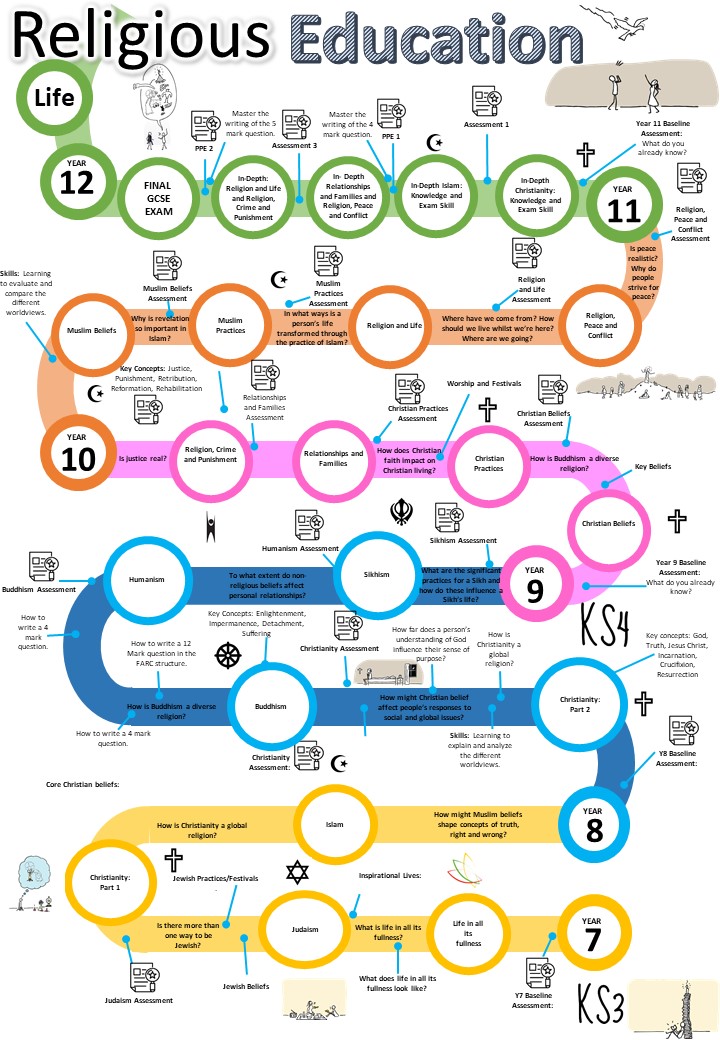Overview of the KS3 Curriculum
Year 7
Unit 1- Life in All Its Fullness
Unit 2- Judaism
Unit 3- Christianity
Unit 4- Islam
Year 8
Unit 1- Christianity
Unit 2- Buddhism
Unit 3- Humanism
Unit 4- Sikhism
KS3 RE: Intent, Implementation and Impact
Intent: It is our intent, at Churchmead School, for the Religious Education curriculum to inspire students to engage with the great faiths and belief systems of the world, challenge students to ask the Big Questions, encourage students to grow in their understanding of others and ultimately to learn to flourish in their life. At KS3, students will have a good understanding of the beliefs and practices of five of the major world religions. This is split across the two years of KS3 as follows: the Year 7 curriculum covers Judaism, Christianity and Islam; the year 8 curriculum covers Christianity, Sikhism and Humanism. The intent of RE at Churchmead is integrally linked to the Biblical vision for the school alongside the school’s values of Courage, Commitment and Compassion; this is shown through the whole of the KS3 curriculum but specifically in the first unit of year 7, Life in All Its Fullness. The KS3 curriculum is inclusive and includes both religious and non-religious world views whilst being rooted in the Christian tradition and gospel-values.
Implementation: Learning is founded upon the progression and development of knowledge leading to understanding and skills leading to a flourishing character. The KS3 curriculum is rigorously planned and takes into account the requirements of the Pan Berkshire Locally Agreed Syllabus alongside the Biblical vision and school values. At KS3, the curriculum has a breadth that means that students have a solid grounding in five of the major world religions. The curriculum plan gives time to each of the religions, to enable students to engage in depth and reflect on their learning and their own beliefs. The KS3 curriculum offers time for students to grow in the following skills: verbal and written communication, analysis of scriptural texts, listening to others and the ability to craft, evaluate and justify an argument. Moreover, progression is embedded through effective use of differentiated questioning techniques in the classroom, deep marking of extended writing or end of unit assessments, alongside written and verbal feedback that students respond to immediately or in DIRT lessons. The first unit in the year 7 curriculum is based entirely on the Biblical vision for the school; Life in All Its Fullness.
Impact: At the end of KS3, the students will be profoundly aware of the origins and history of Christianity as a world faith in all its diversity, as well as a knowledge and understanding of many of the world religions and non-religious worldviews. Students will be able to describe, explain and communicate confidently about religious concepts including the practices and rituals. Students will understand the significance of faith in the life of a religious person and how it shapes their life alongside their morality and actions. Students will have grown in their courage to ask and explore life’s Big Questions, commitment to their own choices and how this shapes their life and the compassion to understand the diversity of others. Students will end KS3 knowledgeable in the diversity of Christianity and the major world faiths, and have developed an understanding of their own self, their own beliefs, actions and their place in school, community, society and the universe.
Overview of the KS4 Curriculum
Year 9
Unit 1- Christian Beliefs
Unit 2- Christian Practices
Unit 3- Relationships and Families
Unit 4- Religion, Crime and Punishment
Year 10
Unit 5- Muslim Beliefs
Unit 6- Muslim Practices
Unit 7- Religion and Life
Unit 8- Religion, Peace and Conflict
Year 11
Term 1- Christian Practices Revision
Term 2- Muslim Practices Revision
Term 3- Thematic Revision
Term 4- Christian Beliefs Revision
Term 5- Muslim Beliefs Revision
KS4 RE: Intent, Implementation and Impact
Intent: Following the AQA Religious Studies A GCSE specification, students will be inspired to have an in-depth engagement with the beliefs and practices of both Christianity and Islam. The curriculum is designed as a spiral curriculum; the GCSE course is covered in year 9 and year 10, this gives the opportunity for consolidation and extension in year 11. The idea behind this model is so that the students get not only a double exposure to the knowledge content, but also an ability to progress hugely with the skills needed with certain questions; particularly growing in the skills needed to answer the four, five and twelve mark questions.
Implementation: The KS4 curriculum is split into the following units: year 9 will cover Christian Beliefs, Christian Practices, Relationships and Families and Religion, Crime and Punishment; year 10 will cover Muslim Beliefs, Muslim Practices, Religion and Life and Religion, Peace and Conflict. At KS4, the curriculum has a depth that means that students have a deep knowledge and understanding of Christianity and Islam. The curriculum plan gives time to each of these religions as well as religious, philosophical and ethical themes.
The KS4 curriculum offers time for students to further grow in the following skills: verbal and written communication, analysis of scriptural texts, listening to others, the ability to craft, evaluate and justify an argument and answer GCSE questions. Moreover, progression is further embedded through effective use of differentiated questioning techniques in the classroom, deep marking of extended writing or end of unit assessments, alongside written and verbal feedback that students respond to immediately or in DIRT lessons.
Impact: At the end of KS4, students will demonstrate a deeper understanding of Christian and Muslim beliefs with a clear understanding of the diversity of belief and practice within these two religions. Students will confidently communicate justified opinions on both sides of an argument, clearly being able to craft arguments and sustain them to a justified conclusion. Students will be able to critically assess ethical issues giving personal, religious and non-religious views. Students will have grown in their understanding of the complex questions of life and how religious people inhabit the world. Students will have confidently grown in religious and cultural literacy.

RE Assessment Policy
KS3 RE Assessment Policy
Assessment at KS3 takes multiple forms, these include: end of unit assessments, extended pieces of writing and creative projects. In the assessments, students will be assessed on how faith influences a believer’s life and they will be able to evaluate the ‘sacredness’ of texts and the impact of divergent interpretations. The KS3 assessments are made up of short questions for a few marks, knowledge recall questions and other questions worth more marks that test a student’s ability to explain, evaluate and use relevant religious teachings. RE assessments at KS3 aim to test a student’s knowledge, their skills of presenting a justified argument, analysis of scriptures and develop a student’s understanding of the diversity and complexity of religions.
KS4 RE Assessment Policy
Every student at KS4 is assessed at the end of each RE GCSE unit that we cover. These end of unit assessments mirror the GCSE assessments and criteria. The assessments include 1, 2, 4,5 and 12 mark questions. The exams will measure how students have achieved the following assessment objectives. AO1: Demonstrate knowledge and understanding of religion and beliefs including: beliefs, practices and sources of authority influence on individuals, communities and societies similarities and differences within and/or between religions and beliefs. AO2: Analyse and evaluate aspects of religion and belief, including their significance and influence. The first assessment that students will take in RE will be in the October of year 9 which means that students have a good amount of time to grow in their ability to answer and succeed in their RE GCSE. In every end of unit assessment students answer a 12 mark question and they are taught to write their answers in the FARC structure, this is a helpful writing scaffold to order a student’s thoughts and make sure they include all the necessary pieces of knowledge alongside structuring their answer as a justified argument.
